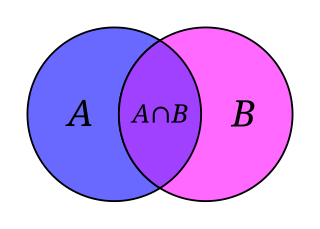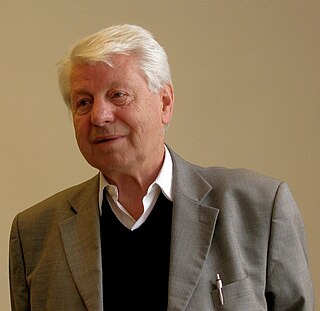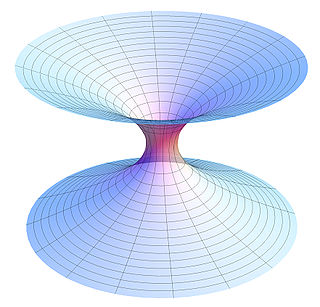An axiom, postulate, or assumption is a statement that is taken to be true, to serve as a premise or starting point for further reasoning and arguments. The word comes from the Ancient Greek word ἀξίωμα (axíōma), meaning 'that which is thought worthy or fit' or 'that which commends itself as evident'.
Naive set theory is any of several theories of sets used in the discussion of the foundations of mathematics. Unlike axiomatic set theories, which are defined using formal logic, naive set theory is defined informally, in natural language. It describes the aspects of mathematical sets familiar in discrete mathematics, and suffices for the everyday use of set theory concepts in contemporary mathematics.

Category theory is a general theory of mathematical structures and their relations that was introduced by Samuel Eilenberg and Saunders Mac Lane in the middle of the 20th century in their foundational work on algebraic topology. Category theory is used in almost all areas of mathematics. In particular, many constructions of new mathematical objects from previous ones that appear similarly in several contexts are conveniently expressed and unified in terms of categories. Examples include quotient spaces, direct products, completion, and duality.

A number is a mathematical object used to count, measure, and label. The most basic examples are the natural numbers 1, 2, 3, 4, and so forth. Numbers can be represented in language with number words. More universally, individual numbers can be represented by symbols, called numerals; for example, "5" is a numeral that represents the number five. As only a relatively small number of symbols can be memorized, basic numerals are commonly organized in a numeral system, which is an organized way to represent any number. The most common numeral system is the Hindu–Arabic numeral system, which allows for the representation of any non-negative integer using a combination of ten fundamental numeric symbols, called digits. In addition to their use in counting and measuring, numerals are often used for labels, for ordering, and for codes. In common usage, a numeral is not clearly distinguished from the number that it represents.

Set theory is the branch of mathematical logic that studies sets, which can be informally described as collections of objects. Although objects of any kind can be collected into a set, set theory — as a branch of mathematics — is mostly concerned with those that are relevant to mathematics as a whole.
In any of several fields of study that treat the use of signs — for example, in linguistics, logic, mathematics, semantics, semiotics, and philosophy of language — the extension of a concept, idea, or sign consists of the things to which it applies, in contrast with its comprehension or intension, which consists very roughly of the ideas, properties, or corresponding signs that are implied or suggested by the concept in question.
In axiomatic set theory and the branches of logic, mathematics, and computer science that use it, the axiom of extensionality, axiom of extension, or axiom of extent, is one of the axioms of Zermelo–Fraenkel set theory. Informally, it says that the two sets A and B are equal if and only if A and B have the same members.
Exponential may refer to any of several mathematical topics related to exponentiation, including:
A bracket is either of two tall fore- or back-facing punctuation marks commonly used to isolate a segment of text or data from its surroundings. They come in four main pairs of shapes, as given in the box to the right, which also gives their names, that vary between British and American English. "Brackets", without further qualification, are in British English the (…) marks and in American English the […] marks.
Possibility is the condition or fact of being possible. Latin origins of the word hint at ability.
Any kind of logic, function, expression, or theory based on the work of George Boole is considered Boolean.

Petr Vopěnka was a Czech mathematician. In the early seventies, he developed alternative set theory, which he subsequently developed in a series of articles and monographs. Vopěnka’s name is associated with many mathematical achievements, including Vopěnka's principle. Since the mid-eighties he concerned himself with philosophical questions of mathematics.
Fredholm is a Swedish surname. Notable people with the surname include:
Large means of great size.

Theoretical physics is a branch of physics that employs mathematical models and abstractions of physical objects and systems to rationalize, explain and predict natural phenomena. This is in contrast to experimental physics, which uses experimental tools to probe these phenomena.

A hypothesis is a proposed explanation for a phenomenon. For a hypothesis to be a scientific hypothesis, the scientific method requires that one can test it. Scientists generally base scientific hypotheses on previous observations that cannot satisfactorily be explained with the available scientific theories. Even though the words "hypothesis" and "theory" are often used interchangeably, a scientific hypothesis is not the same as a scientific theory. A working hypothesis is a provisionally accepted hypothesis proposed for further research in a process beginning with an educated guess or thought.





